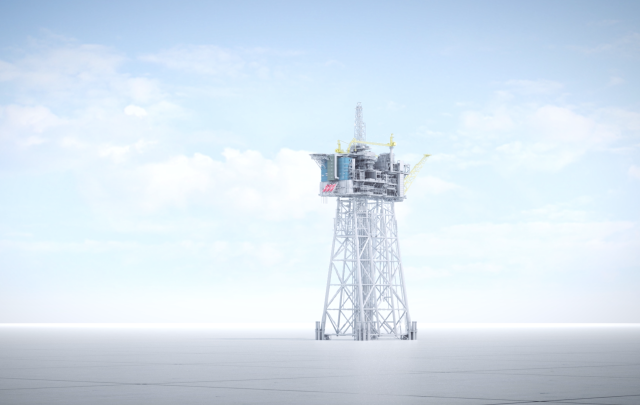
An animation of BP’s concept for next-generation offshore facilities the company is currently developing. (Source: BP Plc)
Some in the industry are finding ways offshore to produce energy smarter as oil and gas companies, large and small, are feeling the pressure to address climate change.
One global oil major, BP Plc, is “deadly serious” about reducing emissions from oil and gas production, said Gordon Birrell, BP’s COO for production, transformation and carbon, at OTC on Monday, May 6.
Last year BP set a target to keep carbon emissions flat out to 2025 even as its oil and gas output grows. Headquartered in London, the company has onshore and offshore oil and gas operations in 78 countries worldwide including a growing renewables business.
RELATED ARTICLE: BP’s Dudley: Oil Industry Can Help Usher In Low-Carbon Future
During an early morning talk at OTC on advancing the energy transition, Birrell shared some of the technologies the company currently deploys to meet its ambitious emissions target, including unveiling BP’s “offshore platform of the future.”
“The concept [for the offshore platform] is it will be simpler, smaller and be operated largely from onshore,” he said.
Other key characteristics of BP’s next-generation oil and gas platform, which is still in the early phases of development, include being partly powered by renewable energy and manned offshore with fewer, “if any,” people.
“In short it will be safer, lower cost and lower emissions,” he said.
Download the 2019 OTC Show Daily Newspaper: May 6; May 7
An example of this concept already being deployed in the field is BP’s Cypre Project offshore Trinidad and Tobago designed to commercialize the Macadamia discovery.
The Cypre Project is a new minimal equipment platform concept combining technology and improved processes to deliver a normally unmanned installation platform that BP said is simpler, safer and greener. The project is operated by BP Trinidad and Tobago, which is a partnership between BP and Repsol SA.
Birrell, who has more than 30 years of upstream oil and gas experience with BP, stepped into his current role at the company in March 2017. He previously served as regional president for BP’s Azerbaijan, Georgia and Tur-key business.
During his presentation at OTC, Birrell also spoke about the “dual challenge” faced by oil and gas companies.
First, companies need to meet continued energy demand growth as 2.5 billion people move from low to middle incomes and the world population grows by another 2 billion people over the next 20 years. Secondly, companies need to reduce emissions by 50% over 20 years to meet the goals from the Paris Climate Accord.
In BP’s 2019 Energy Outlook released in February, the company projected 85% of the growth in future energy supply will be generated through renewable energy and natural gas. In particular, BP claims renewables will become the largest source of global power generation by 2040.
However, despite renewables being on track to becoming the fastest-growing energy source, Birrell said that oil and gas also will continue to play a role in the energy transition.
“The dual challenge can’t be about a race to renewable ... It’s got to be a race to lower carbon emissions,” he said.
In its latest projection, BP expects demand for oil will grow in the first half of its outlook period before gradually plateauing at about 108 MMbbl/d by the mid-2030s.
Across all scenarios concerning oil demand considered in the BP Outlook, the company said trillions of dollars of continued investment in new oil will be required to meet oil demand in 2040.
Birrell addressed the massive need for ongoing investment in the oil and gas industry and also warned against the movement to divest from fossil fuels.
“Some would argue we should just stop investing in oil and gas—that has huge ramifications,” he said. “Ramifications for rising prices, potentially financial instability, will impact economic prosperity in the world and ultimately impact the quality of the lives of people around the world.”
Recommended Reading
Fire Closes Atlas Energy’s Kermit, Texas Mining Facility
2024-04-15 - Atlas Energy Solutions said no injuries were reported and the closing of the mine would not affect services to the company’s Permian Basin customers.
Coalition Launches Decarbonization Program in Major US Cities, Counties
2024-04-11 - A national coalition will start decarbonization efforts in nine U.S. cities and counties following a federal award of $20 billion “green bank” grants.
Exclusive: Scepter CEO: Methane Emissions Detection Saves on Cost
2024-04-08 - Methane emissions detection saves on cost and "can pay for itself," Scepter CEO Phillip Father says in this Hart Energy exclusive interview.
Majority of Recent CO2 Emissions Linked to 57 Producers - Report
2024-04-03 - The world's top three CO2-emitting companies in the period were state-owned oil firm Saudi Aramco, Russia's state-owned energy giant Gazprom and state-owned producer Coal India, the report said.



